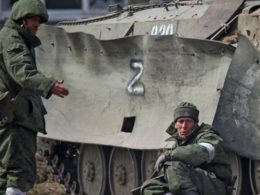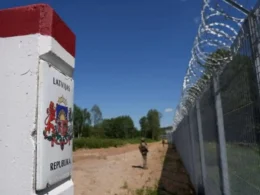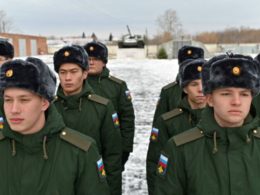The Kremlin’s campaign of “Russification” in Ukraine is burning back into Russia itself as it continues to empower and amplify overtly nationalist voices and ideologies.
Russia is engaged in a campaign of deliberate “Russification” within
Ukraine aimed at the destruction of Ukrainian identity through a multitude of military, social, economic, legal, bureaucratic, and administrative lines of effort.
The ideologies that underpin the basis of this “Russification” also form the rhetorical backbone of the pro-war information space, which frequently mirrors its militarism with staunch Russian nationalism and intense xenophobia that is directed both at Ukraine and Ukrainian identity as well as at domestic minorities within Russia itself.
The domestic ramifications of the acceptance of the ideology of “Russification” are manifested in the responses by Russian authorities and prominent Russian milbloggers to ethnic minorities in Russia.
Several Russian milbloggers and commentators published
their reactions to a recent news story about the murder of a 17-year-old Russian student by a group of Tajik migrants in Chelyabinsk and used the story to criticize Central Asian migrants and ethnic minority communities for failing to integrate into Russian society.
Head of the Russian Investigative Committee Alexander Bastrykin accused migrants of destabilizing Russia by importing terrorism and extremist ideologies and emphasized the role of migration policy in ensuring public order.
Former Russian officer and ardent nationalist Igor Girkin amplified a criticism that authorities of the Tuvan Republic are returning the indigenous Tuvan names to 104 administrative-territorial units, which one milblogger decried as “pushing boundaries” unnecessarily during wartime.
Social media footage circulated on April 12 shows a group of Russian men reportedly giving the Nazi salute and walking past administrative buildings in Ufa, Bashkortostan, while shouting, “Russia is for Russians.”
These instances of xenophobia and racism exemplify the crux of domestic “Russification.” The war in Ukraine has empowered the most virulent voices in the information space to consolidate their ideology and project it both toward the Ukrainian people and toward non-Slavic minorities in Russia itself. This dynamic will likely escalate as the war continues and will outlive Russia’s invasion of Ukraine, pervading the Russian domestic space for years to come.
These domestic-facing ramifications of “Russification” ironically continue to place the war effort's onus on the communities it marginalizes.
Bastrykin has previously called for military authorities to specifically recruit migrants from Central Asia and the Caucasus who received Russian citizenship because these migrants have a “constitutional obligation to protect the country that received them.”
Russian officials at the Sakharovo migrant center in Moscow reportedly require the center’s employees to offer migrants contracts for military service, as ISW previously reported.
Russian officials have continuously targeted migrant and ethnic minority communities in ongoing force generation efforts, which largely places the military burden of the “Russification” project in Ukraine on communities and individuals that are its targets domestically.
Read also:
- Moscow demonized Ukrainians exploiting ethnic discord it promoted in Russia, activist from Kamchatka says
- Inter-ethnic animosity saps effectiveness of Russia’s army in Ukraine
- League of Free Nations: Indigenous activists from Russia to fight for independence from Moscow
- Russia’s Erzya national movement recognizes Holodomor as genocide of Ukrainians
- “Russian” combat losses in Ukraine appear to be disproportionately non-Russians or ethnic Russians from rural areas
- Russia’s transformation of ethnic mix in occupied Crimea an act of genocide
- Japanese expert: Ethnic Ukrainians form 60% of Northern Territories’ (Kuriles’) population
- Russians persecuting ethnic Ukrainians and other ethnic groups, leading rights groups say





